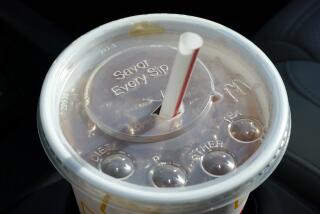Container Firm Hurt by Order to Hold the Foam
- Share via
The surprise decision by McDonald’s Corp. to stop using the foam-like containers for its hamburgers is bad news for Olson Industries Inc. in Sherman Oaks.
Olson, which conducts nearly all its business through its Dolco Packaging unit, is one of several companies supplying the containers to McDonald’s, which attributed its decision to consumers’ environmental concerns about the foam packages. Dolco also makes similar polystyrene-based egg cartons and other packaging goods that are marketed to restaurants and schools.
McDonald’s announcement last week that it will abandon the foam cartons in favor of paper wrapping means Dolco will lose somewhat less than 15% of its business, Dolco President Larry E. Rembold said. It adds up to several million dollars, as Olson’s total sales last year were $73.5 million.
One Dolco plant, in Wenatchee, Wash., will lose more than 50% of its business because of the McDonald’s move, Rembold said. But he said Dolco is planning to shift enough new work to Wenatchee to maintain the plant’s 85-member work force.
The McDonald’s pullout might not be a fatal blow to Dolco and Olson, but they already have enough problems. Because of major losses in recent years, Dolco has been operating under Chapter 11 of the federal bankruptcy laws since May, 1989. Under Chapter 11, a company is shielded from creditors’ lawsuits while it works out a plan to pay its bills.
Still, Rembold said the McDonald’s action “is not the demise of our business and not the demise of our industry.” The McDonald’s move is expected to be followed by some other major fast-food chains that use foam containers, but Dolco does not sell to “any other significant or national name or big-name fast-food company,” he said.
He also said the McDonald’s decision will not affect Dolco’s plan to emerge from bankruptcy proceedings in April. “We have a solid business and we’re performing very well under the circumstances,” Rembold said.
Olson Industries lost $2.1 million last year, after losing $4.1 million in 1988. A good part of those losses was blamed on rising prices for polystyrene resin, the key raw material used in making Dolco’s packages.
The losses had started to narrow early this year as resin prices fell. In the first six months of 1990, Olson’s losses totaled $530,867, down from $914,730 a year earlier. But the Persian Gulf crisis, stemming from Iraq’s invasion of Kuwait on Aug. 2, has again lifted resin prices.
Rembold asserted that “we have been able to pass those price increases along to our customers,” which should mitigate the effect of the price hikes on Olson’s financial results.
But for many Olson investors, the damage has been done. Olson’s stock, which stood at $29.50 a share at the end of 1986, is now quoted at less than $1 a share as part of the thinly traded market for “pink sheet” stocks.
More to Read
Inside the business of entertainment
The Wide Shot brings you news, analysis and insights on everything from streaming wars to production — and what it all means for the future.
You may occasionally receive promotional content from the Los Angeles Times.











